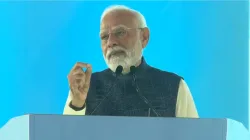'Colonial laws were source of British oppression, exploitation,' says PM Modi at event on three criminal laws
New criminal laws: Three new criminal laws— Bhartiya Nyaya Sanhita, Bhartiya Nagarik Suraksha Sanhita, and Bhartiya Sakshya Adhiniyam— have replaced the erstwhile IPC, CrPC and the Evidence Act respectively.

Prime Minister Narendra Modi on Tuesday addressed a event marking the implementation of three new criminal laws in Chandigarh. During the event, he said, "I congratulate the countrymen on the implementation of the new law. It took a lot of hard work from jurists and constitutionalists to make it."
Post-independence, PM Modi said, "People thought that now that the British had gone, they would be free from the British laws. Those laws were the means of oppression and exploitation by the British."
Talking about the big change brought by the govt, he said, "A strong discussion was held on the challenges faced by the justice system in the seven decades of independence." Bidding hope that new laws will facilitate the modern day challenges of jurisprudence, the PM said, "I am confident that this Nyaya Sanhita of Bharat, made with everyone's cooperation, will prove to be a milestone."
Tracing the history of Chandigarh, PM Modi said, "Chandigarh is identified with Mother Chandi. Truth and Justice were established by Mother Chandi and this is also the basis of these laws." He added, "Coming to Chandigarh, I feel as if I have come among my own people."
Notably, on July 1, the Indian Penal Code (IPC), the Code of Criminal Procedure (CrPC) and the Evidence Act were replaced by the Bharatiya Nyaya Sanhita (BNS), the Bharatiya Nagarik Suraksha Sanhita (BNSS) and the Bharatiya Sakshya Adhiniyam (BSA).
The new laws introduce several progressive measures aimed at streamlining legal procedures and enhancing the efficiency of law enforcement. One of the notable provisions is the introduction of Zero FIR, which allows individuals to file a First Information Report (FIR) at any police station, irrespective of the location where the crime occurred.